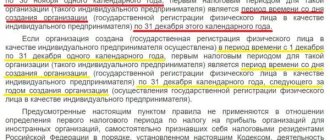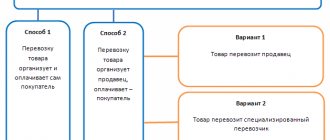Procedure for accounting for expenses for income tax purposes
There is a rule in tax legislation: for those who use the accrual method, expenses for income tax purposes are recognized in the reporting (tax) period to which they relate (clause 1 of Article 272 of the Tax Code of the Russian Federation). At the same time, for a number of expenses the specific moment of their recognition is determined. For example, for expenses for payment to third-party organizations for work performed (services provided), the date of recognition of such expenses is the date of settlement in accordance with the terms of concluded contracts or the date of presentation to the taxpayer of documents serving as the basis for making calculations, or the last date of the reporting (tax) period ( subparagraph 3, paragraph 7, article 272 of the Tax Code of the Russian Federation).
Please note that the provisions of Chapter 25 of the Tax Code of the Russian Federation do not provide for the possibility of arbitrarily choosing the tax period in which these expenses should be reflected. Currently, only for VAT the right of the taxpayer to transfer tax amounts for deduction to future periods within three years is legislated (clause 1.1 of Article 172 of the Tax Code of the Russian Federation).
It turns out that taxpayers are not given the right to take into account expenses in the period in which they wish?
Recognition of expenses for profit tax purposes
Recognition of expenses for profit tax purposes
From January 1, 2002, to calculate income tax, taxpayers reduce the income received by the amount of expenses incurred.
Consequently, in order to calculate profit, it is necessary to determine the procedure for accounting for expenses accepted in accordance with tax legislation to reduce taxable income. The composition of expenses taken into account for the purposes of calculating income tax is determined by Articles 252-269 of the Tax Code of the Russian Federation.
According to paragraph 1 of Art. 252 of the Tax Code of the Russian Federation, taxpayers can reduce their taxable profit by the amount of expenses incurred that meet the following requirements in aggregate:
- expenses must be justified (economically justified);
- expenses must be confirmed by documents drawn up in accordance with the legislation of the Russian Federation;
- expenses must be incurred to carry out activities aimed at generating income.
Economic justification of expenses
According to para. 3 p. 1 art. 252 of the Tax Code of the Russian Federation, justified expenses are understood as economically justified expenses, the assessment of which is expressed in monetary form.
When applying the concept of “economic justification,” the question arises: what does the Tax Code mean by this term? It is sad to note once again that such a concept has not even been roughly established by the legislator and is entirely of an evaluative nature (which is likely to become the cause of numerous disputes with the tax authorities, including during court proceedings). This provision, strictly speaking, is not consistent with other provisions of the Tax Code of the Russian Federation, in particular:
- from paragraph 1 of Art. 17 of the Tax Code of the Russian Federation, according to which a tax is considered established only if taxpayers and elements of taxation, including the tax base, are determined. In relation to income tax, the tax base is profit, defined as income received, reduced by the amount of expenses incurred, established in accordance with Chapter 25 of the Tax Code of the Russian Federation;
- from paragraph 6 of Art. 3 of the Tax Code of the Russian Federation, which provides that legislative acts on taxes and fees must be formulated in such a way that everyone knows exactly what taxes (fees), when and in what order he must pay.
Consequently, in order for a taxpayer to be able to use the term “economic justification,” the legislator should at least roughly regulate the procedure for recognizing expenses, and not use valuation categories.
At the present time, we can only say that certainty in the interpretation of the concept of “economic justification” will appear only after the accumulation and generalization of judicial practice on relevant tax disputes. The best option was to adopt an information letter from the Presidium or a resolution of the Plenum of the Supreme Arbitration Court on this issue (in this case, no changes will be required from the legislator).
Let us note that the definition of the concept “economic justification” and the explanations of the Ministry of Taxes of Russia, which proposes that economically justified costs are understood as costs (expenses) determined by the goals of generating income, satisfying the principle of rationality and determined by business customs (commentary to Article 252 of the Tax Code) do not bring clarity RF Methodological recommendations for the application of Chapter 25 of the Tax Code of the Russian Federation).
The concept of “business custom” is a term of civil law that denotes a rule of behavior not provided for by law or contract, but an established one, that is, quite defined in its content, widely used in any area of business activity, for example, traditions of fulfilling certain obligations and etc. (Resolution of the Plenum of the Supreme Court of the Russian Federation and the Plenum of the Supreme Arbitration Court of the Russian Federation dated July 1, 1996 N 6/8 “On some issues related to the application of part one of the Civil Code of the Russian Federation”).
What the term “rationality” means in relation to tax accounting is generally unknown, since in accounting the requirement of rationality refers to rational accounting, based on the conditions of economic activity and the size of the organization (clause 7 of PBU 1/98 “Accounting Policy of Organizations”), and in it is not defined at all in other legislation.
In addition, the application of the concept of “economic feasibility” in specific situations analyzed by the Ministry of Taxes of Russia in the Methodological Recommendations for the Application of Chapter 25 of the Tax Code of the Russian Federation is puzzling. Let's look at some of them, which give an idea of what position the tax authorities take regarding the economic justification of expenses.
For example, the Ministry of Taxes of Russia concludes that the costs of purchasing work clothes, safety shoes and protective equipment, which are subject to inclusion in expenses on the basis of paragraphs. 3 p. 1 art. 254 of the Tax Code of the Russian Federation, only if their mandatory use by workers of a particular profession is provided for by the legislation of the Russian Federation. Moreover, such expenses should be recognized as economically justified (and, therefore, taken into account as expenses when taxing profits) only if they are made in accordance with the Rules for providing workers with special clothing, special footwear and other personal protective equipment (approved by the resolution of the Ministry of Labor of Russia dated December 18 .98 No. 51) according to the Standard Standards for the free issuance of special clothing, special footwear and other personal protective equipment to workers in cross-cutting professions and positions in all sectors of the economy (approved by Resolution of the Ministry of Labor of Russia dated December 30, 1997 No. 69).
The above rules and regulations relate to the provision of special clothing to workers engaged in work with harmful or dangerous working conditions, as well as work performed in special temperature conditions or associated with pollution, and are mandatory for use. However, the Tax Code of the Russian Federation does not in any way limit for tax purposes the organization’s expenses for providing workers with special clothing and does not make them dependent either on the rules provided by the Russian Ministry of Labor or on working conditions. The purpose of the by-law regulation by these acts of the Russian Ministry of Labor is not to ensure taxation, but solely to protect labor safety and protect the life and health of workers. The Ministry of Taxes and Taxes of Russia, making reference to the by-laws of the Ministry of Labor, goes beyond the scope of its powers established in Art. 4 of the Tax Code of the Russian Federation, since in this way it complements the norms of the Tax Code of the Russian Federation.
Based on the fact that a broad interpretation of the law is unacceptable, the Ministry of Taxes and Taxes of Russia should not decide for the entrepreneur whether it is profitable or not for him to provide workers with special clothing, while issuing one cotton robe every year or two.
Or another example. According to the Ministry of Taxes of Russia, the costs of recruiting employees, including payment for the services of specialized recruitment companies, are not economically justified and are not taken into account when taxing profits if the organization has not actually recruited employees, including as a result of considering candidates, presented by specialized recruitment companies. In other words, if an organization has turned to a specialized personnel recruitment organization, it is obliged to hire at least one person (even for a month), in order for the costs to be included in the expenses (regardless of whether the corresponding candidacies).
In this situation, we should not forget that one of the main features of entrepreneurial activity is its risky nature (Article 2 of the Civil Code of the Russian Federation): that is, this activity can bring both profit and loss. Therefore, if, as a result of this risk, the organization incurred costs for the services of recruiting companies, but did not derive any benefit from it (that is, did not find the right employee), this does not mean that these costs are economically unjustified. Their economic justification can be proven by the fact that contacting a recruiting company could lead to finding the employee needed by the customer.
Thus, the economic justification of expenses means, among other things, that their incurrence could lead to a favorable economic result for the taxpayer.
Based on the above, it is clear what difficulties await taxpayers due to the insufficiently clear wording of the law. However, taxpayers who do not want to argue with the tax authorities will have to carefully consider this concept and have evidence that a particular transaction is necessary for the normal functioning of the organization, obtaining future profits, or could lead to a favorable economic result.
Documentary evidence of expenses
Documented expenses mean expenses confirmed by documents drawn up in accordance with the legislation of the Russian Federation (paragraph 4, paragraph 1, article 252 of the Tax Code of the Russian Federation). Based on this formulation of the law, two important conclusions follow.
Firstly, expenses that are not supported by documents cannot be recognized as expenses. However, in practice situations often occur when documents confirming expenses in the current reporting (tax) period (having the corresponding date) are received by the organization in the next reporting period. In this case, for tax accounting purposes, it is necessary to take into account the corresponding expenses in the reporting (tax) period when they were actually incurred, that is, recalculate tax liabilities in the period when the error was made (clause 1 of Article 54 of the Tax Code of the Russian Federation).
Moreover, the recalculation of tax liabilities can be done without much difficulty if the taxpayer has the opportunity to meet the deadlines for paying the tax and submitting the income tax return to the tax authorities. Otherwise, the taxpayer will need to make the appropriate recalculations and submit corrected calculations to the tax authorities (since we are talking about timely unaccounted expenses, the organization will not have to pay additional income tax).
Let us note that for the purposes of accounting, built on the principles of matching income and expenses, an expense should be recognized in the period of its occurrence in the assessment provided for by the contract or on the basis of other preliminary calculations, and in the period when documents appear, the previously recorded amount of expenses is subject to appropriate adjustment ( decrease or increase based on the amount of actual expenses specified in the primary document).
Secondly, documents confirming the costs incurred must be drawn up in accordance with the legislation of the Russian Federation. This wording of the law also conceals a great threat to the taxpayer, since the Tax Code does not determine in accordance with what specific legislation documents must be drawn up.
In the commentary to Art. 252 of the Tax Code of the Russian Federation of Methodological Recommendations for the Application of Chapter 25 of the Tax Code of the Russian Federation The Ministry of Taxes and Taxes of Russia explains that the procedure for drawing up documents must be provided for by the regulatory legal acts of the relevant executive authorities, which, in accordance with the legislation of the Russian Federation, are given the right to approve the procedure for drawing up and forms of primary documents that are used to draw up business operations.
In other words, documents must be compiled according to approved forms, otherwise the taxpayer will not be able to recognize an expense for profit tax purposes. This situation will certainly lead to conflict situations, for example, in the case where there are documents confirming expenses, but they are drawn up with any deviations from the approved form.
When deciding whether the expenses incurred are confirmed by documents received from the counterparty under the agreement, one should proceed from the fact that the taxpayer is not responsible for the preparation of documents by third parties. The courts have also expressed this position. For example, during a tax audit, the tax authorities found corrections in certain documents (cash orders and invoices) documents confirming the entrepreneur’s expenses. Moreover, these corrections were not confirmed by the signatures and seals of the persons who compiled them. The inspectorate considered them unconfirmed, however, the court indicated that the documents with corrections were not drawn up by the taxpayer himself, therefore it cannot be said that there were no actual costs incurred (resolution of the Federal Antimonopoly Service of the North-Western District dated December 3, 2001 in case No. 3320, resolution of the FAS North-Western District Western District dated August 27, 2001 in case No. A56-13404/01).
Let us note that the tax authorities often consider the expenses of organizations, drawn up with supporting documents in accordance with the requirements of legislative acts, to be unreasonably included in the expenses taken into account when taxing profits, if there are violations by the counterparty. For example, if the counterparty under the contract has not passed state registration (or does not exist at all) or has not reflected the business transaction in its accounting. However, courts, as a rule, do not support this position.
In particular, during the tax audit, the taxpayer presented properly executed documents justifying the expenses incurred. However, the tax inspectorate decided that the submitted documents cannot confirm the expenses, since the organization from which the goods were purchased is not registered in the prescribed manner (that is, does not exist), and, therefore, the transaction is illegal. However, the court indicated that the legality of transactions made by the taxpayer with third parties in this case does not matter, since the inspectorate must prove the illegality of the documents themselves submitted by the taxpayer. Due to the fact that the documents are properly executed, the expenses should be considered confirmed (resolution of the Federal Antimonopoly Service of the East Siberian District dated November 21, 2001 in case No. A/58-1157/01-F02-2729/01-S1).
In another situation, the tax authorities did not accept the amount of purchased materials as expenses that reduce profit, since a counter audit was carried out and the seller’s transaction for the sale of materials was not reflected in the accounts. The court found such actions to be unfounded, since the taxpayer is not responsible for the actions of third parties, including for failure to account for relevant transactions with the counterparty in transactions (resolution of the Federal Antimonopoly Service of the Volga-Vyatka District dated March 15, 2001 in case No. A79-1881/2000-SK1- 1692).
Carrying out expenses for the purpose of generating income
Any expenses are recognized as expenses, provided that they were incurred to carry out activities aimed at generating income (paragraph 4, paragraph 1, article 252 of the Tax Code of the Russian Federation). This means that the taxpayer can reduce income by the amount of any expenses incurred in connection with the receipt of income. Therefore, the list of expenses mentioned in Chapter 25 of the Tax Code of the Russian Federation is not closed and is subject to broad interpretation.
Footnotes:
- Despite the fact that the implementation of expenses for the purpose of generating income is specified in the Tax Code as a separate provision.
- Moreover, the principle of rationality is not defined in any way in either tax or civil legislation, and the custom of business transactions may not be enshrined in any document (Article 5 of the Civil Code of the Russian Federation).
- A similar position is supported by the Ministry of Taxes of Russia in its letter dated March 3, 2000 No. 02-01-16/28, indicating that if errors or distortions are detected in the calculation of the tax base relating to past tax (reporting) periods, in the current (reporting) ) tax period, recalculation of tax liabilities is carried out during the period when an error was made, and such recalculation can be made both in the direction of increasing tax liabilities and in the direction of decreasing them
- For example, as an uninvoiced delivery or goods in transit.
- A similar position was expressed by the FAS Volga-Vyatka District (resolution dated July 24, 2001 in case No. A29-944/01A), the FAS Northwestern District (resolution dated December 3, 2001 No. A56-15188/01).
But what about Article 54 of the Tax Code of the Russian Federation?
At the same time, there is Article 54 of the Tax Code of the Russian Federation, which is applied in a situation where a company made an error/distortion in calculating the tax base, and this error relates to the previous period. It is this item, according to some accountants, that allows you to “play” with expenses beyond one calendar year. Is this really true?
Based on this article, as a general rule, if an error is discovered, it is necessary to recalculate the tax base and, accordingly, the tax itself in the period in which the error was made (clause 1 of Article 54 of the Tax Code of the Russian Federation). It was admitted, not revealed.
However, there are exceptions to this rule (paragraph 3, paragraph 1, article 54 of the Tax Code of the Russian Federation). In two cases, it is allowed to make adjustments in the current period (during the period when errors/distortions are identified), which will allow you to avoid having to draw up an updated declaration:
- when it is impossible to understand which period the error/distortion belongs to;
- when an error/distortion resulted in excessive payment of tax.
We are interested in the second case – when, due to an error, the organization overpaid the tax. Therefore, if we assume that the “non-accounting” of any expenses last year was caused by an error and because of this “error” the company overpaid the tax, then it can take these expenses into account in the current period.
Thus, the norm seems to be working and, indeed, at first glance, allows companies to take into account expenses whenever they wish (taking into account a three-year period). However, as practice shows, not everything is so smooth. Companies in such situations may face difficulties during tax audits.
Expenses in the form of negative exchange rate differences
As stated earlier, for organizations that use the cash method and incur expenses denominated in foreign currency, the date of recognition of expenses for profit tax purposes is the date of actual payment for goods (work, services).
Exchange rate differences on debt, foreign currency loans, and contributions to the authorized capital can only arise for those organizations that determine expenses for profit tax purposes using the accrual method. Consequently, organizations that apply the procedure for determining expenses for tax purposes using the cash method do not generate exchange rate differences. But exchange rate differences will still have to be reflected in accounting. This is a requirement of PBU 3/2000.
Tax authorities are against arbitrarily choosing a period to reflect expenses
Situations where taxpayers arbitrarily choose a tax period to reflect certain expenses are, in practice, perceived negatively by auditors. They see this as not an error/distortion that can be corrected according to the rules of paragraph 1 of Art. 54 of the Tax Code of the Russian Federation, but an intentional action, the purpose of which is to prevent the occurrence of a tax loss. And, as a result, “late” amounts are completely excluded from tax expenses.
They argue their position by the fact that tax legislation does not provide for the possibility of arbitrarily choosing the tax period in which these expenses should be reflected.
The most risky situation is when the period to which the expenses relate does not fall within the three-year tax audit period. In this case, tax authorities may conclude that they do not have the opportunity to verify the fact of excessive tax payment due to an error/distortion.
Also, you should not shift expenses over a long period. It is necessary to ensure that by the time the error is corrected (accounting for “late” expenses), the established art. 78 of the Tax Code of the Russian Federation is a three-year period for the return (offset) of overpayments, taking into account that only during the specified period companies have the right to dispose of the corresponding amount of tax overpaid to the budget.
Costs associated with production and sales
Costs associated with production and sales include:
- expenses for production, storage and delivery of goods, performance of work or provision of services;
- expenses associated with the acquisition and sale of purchased goods;
- expenses for maintenance, operation, repair and maintenance of fixed assets, as well as for maintaining them in good condition;
- expenses for the development of natural resources;
- R&D expenses;
- expenses for compulsory and voluntary insurance;
- expenses associated with the acquisition of rights to state (municipal) land plots on which buildings are located or capital construction will be carried out (Article 264.1 of the Tax Code of the Russian Federation);
- other expenses.
This is stated in paragraph 1 of Article 253 of the Tax Code of the Russian Federation.
Clause 5.1 of Article 272 of the Tax Code of the Russian Federation
Standardization expenses incurred by the taxpayer independently or jointly with other organizations (in an amount corresponding to its share of expenses) are recognized for tax purposes in the reporting (tax) period following the reporting (tax) period in which the standards were approved as national standards national body of the Russian Federation for standardization or registered as regional standards in the Federal Information Fund of Technical Regulations and Standards in the manner established by the legislation of the Russian Federation on technical regulation. (Clause introduced - Federal Law dated November 21, 2011 No. 330-FZ)
Clause 1.1 of Article 272 of the Tax Code of the Russian Federation
The taxpayer recognizes expenses from carrying out activities related to the production of hydrocarbons at a new offshore hydrocarbon field in the tax (reporting) period to which they relate, regardless of the time of actual payment of funds and (or) other form of payment, but not earlier than the date of allocation of a new offshore hydrocarbon deposit on a subsoil plot or in the cases provided for in paragraph 8 of Article 261 of this Code, the date of the taxpayer’s decision to complete work on the development of natural resources or part thereof on a specified subsoil plot or to completely stop work on a subsoil plot in due to economic inexpediency, geological futility or other reasons. (As amended by Federal Law No. 199-FZ dated July 19, 2018)
If more than one new offshore hydrocarbon deposit is allocated on a subsoil plot, the amount of expenses up to the date of allocation of new offshore hydrocarbon deposits on a subsoil plot related to activities related to the production of hydrocarbon raw materials at a new offshore hydrocarbon deposit carried out at each new offshore hydrocarbon deposit this subsoil plot is determined taking into account the provisions of paragraph 4 of Article 299.4 of this Code.
The expenses specified in this paragraph, expressed in foreign currency, for tax purposes are recalculated into rubles at the official rate established by the Central Bank of the Russian Federation on the dates corresponding to the dates of recognition of similar types of expenses in accordance with paragraphs 2 - 8.1 of this article, without taking into account the provisions of paragraph one of this paragraph, as well as the provisions of paragraphs 7 and 8 of Article 261 of this Code.
(Clause introduced - Federal Law dated November 27, 2017 No. 335-FZ)
Clause 8, Article 272 of the Tax Code of the Russian Federation
Under loan agreements or other similar agreements (including debt obligations issued by securities), the validity of which falls on more than one reporting (tax) period, for the purposes of this chapter, the expense is recognized as incurred and is included in the relevant expenses at the end of each month of the corresponding reporting period. (tax) period, regardless of the date (terms) of such payments provided for in the agreement.
If a loan agreement or other similar agreement (including debt obligations issued by securities) stipulates that the fulfillment of an obligation under such an agreement depends on the value (or other value) of the underlying asset with the accrual of a fixed interest rate during the validity period of the agreement, expenses accrued based on this fixed rate, are recognized on the last day of each month of the corresponding reporting (tax) period, and expenses actually incurred based on the current value (or other value) of the underlying asset are recognized on the date of fulfillment of the obligation under this agreement.
In the event of termination of the agreement (repayment of the debt obligation) during a calendar month, the expense is recognized as incurred and is included in the corresponding expenses on the date of termination of the agreement (repayment of the debt obligation).
The provisions of this paragraph do not apply to expenses in the form of interest accrued on the amount of claims of the bankruptcy creditor in accordance with the legislation on insolvency (bankruptcy).
(Clause as amended by Federal Law dated December 28, 2013 No. 420-FZ)
Clause 3 of Article 272 of the Tax Code of the Russian Federation
Depreciation is recognized as an expense on a monthly basis based on the amount of accrued depreciation, calculated in accordance with the procedure established by Articles 259, 259.1, 259.2 and 322 of this Code. (As amended by Federal Laws No. 57-FZ dated May 29, 2002; No. 158-FZ dated July 22, 2008)
Expenses in the form of capital investments provided for in paragraph 9 of Article 258 of this Code are recognized as indirect expenses of the reporting (tax) period on which, in accordance with this chapter, the start date of depreciation (date of change in the original cost) of fixed assets in respect of which capital investments have been made. (Paragraph introduced - Federal Law dated 06.06.2005 No. 58-FZ; as amended by Federal Law dated 22.07.2008 No. 158-FZ)
Cash method in tax accounting - application rules
The cash method means that all cash flows are recognized as income on the date they are received in the company's current account or cash register.
As a rule, this method is used for simplified taxation. Companies on OSNO also have the right to use it, but only on the condition that revenue for the last four quarters in a row did not exceed 1 million rubles. without VAT. The term “average value” of revenue raises a logical question: if the total amount is close to 4 million rubles, can it be less than 1 million rubles in a particular quarter? and, accordingly, in another quarter - more than this value? For example, in the first quarter - 0.5 million rubles, in the second quarter - 1.4 million rubles, in the next two quarters - 1 million rubles each.
In practice, to determine whether the cash method can be applied, the average revenue is calculated each quarter by adding the revenue for the previous four consecutive quarters and dividing the resulting amount by 4.
Example:
A company intending to determine its average quarterly revenue will need to do the following: If the task is to calculate this indicator for the 2nd quarter, then it needs to sum up the revenue amounts for the 3rd, 4th quarter of the previous year and the 1st quarter of the current year, and then divide the resulting amount by 4.
Despite all the obviousness and simplicity of such a decision, there are alternative opinions supported by arbitration courts. Thus, in the resolution of the Federal Antimonopoly Service of the North Caucasus District dated March 23, 2005 N F08-831/2005-363A, the arbitrators supported the position of the Federal Tax Service that the amount of revenue should be calculated for four quarters included in one tax period.
If we adhere to the logic of tax inspectors, then the above example will be erroneous. Therefore, in order to avoid unpleasant incidents, it is better for the taxpayer to send a request to his Federal Tax Service and follow the recommendations of its specialists.
Let us note that in addition to these persons, the cash method can also be used in accounting by newly created organizations. On the one hand, the Tax Code of the Russian Federation does not contain direct rules in this regard. However, in the letter of the Federal Tax Service of Russia for Moscow dated 07/08/2002 N 26-12/31553 it is noted: since the organization has just been registered, it does not yet have large incomes. That is, the amount of its revenue fits well into the above framework. You can come to the same conclusion on your own by analyzing the provisions of paragraph 1 of Art. 273 Tax Code of the Russian Federation.
ConsultantPlus experts have prepared a step-by-step guide to tax accounting for income and expenses using the cash method. If you don't have access to the system, get a free trial online.
Cash method in accounting
The choice of method for determining income and expenses in accounting should be enshrined in the accounting policy. An organization can use either the accrual method or the cash method.
The accounting regulations “Income of the organization” PBU 9/99 (approved by order of the Ministry of Finance of the Russian Federation dated May 6, 1999 N 32n) allows the recognition of income as funds are received from buyers by small businesses, with the exception of issuers of publicly placed securities, and also to socially oriented non-profit organizations (clause 12 of PBU9/99 “Income of the organization”). In this case, according to PBU 9/99, the following conditions must be met:
- the organization has the right to receive revenue arising from a specific contract or otherwise confirmed in an appropriate manner;
- the amount of revenue can be determined;
- there is confidence that as a result of a particular transaction there will be an increase in the economic benefits of the organization;
- the expenses that have been or will be incurred in connection with this operation can be determined.
If the organization has adopted the procedure for recognizing revenue from the sale of products and goods after receipt of funds and other forms of payment, then expenses, in accordance with the Accounting Regulations “Expenses of the Organization” PBU 10/99 (approved by order of the Ministry of Finance of the Russian Federation dated May 6, 1999 N 33n), are recognized after the debt has been repaid (clause 18 of PBU 10/99).
For those who are obliged to use the accrual method in accounting, we recommend that you read the material “What is the essence and features of the accrual method in accounting”






